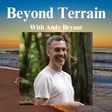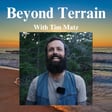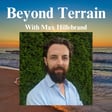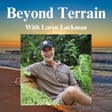Podcast Introduction
00:00:01
beyondterrain
Welcome everybody to another episode of the Beyond Terrain podcast. I'm your host, Liam Dalton.
Guest Introduction: Jamie Andrews
00:00:06
beyondterrain
Today we're joined by Mr. Jamie Andrews. Once again, we had an amazing presentation from him last time. Um, obviously this man is doing some phenomenal work. Um, you should definitely go listen to the last episode.
Buzz in Terrain Field
00:00:18
beyondterrain
If you did not listen to it, uh, got quite a few hits. I think most of the, most of the listeners got to it. Um, this is a huge buzz in the terrain field. So, um, I'm very fortunate to.
00:00:30
beyondterrain
be able to chat with this gentleman again.
Falsification in Cell Culture Methodology
00:00:32
beyondterrain
um I'm really excited to sort of dig into his insights and thoughts beyond sort of the project that he's doing with the falsification of the cell culture methodology. um Just kind of really excited to learn more about him and learn more about, you know, how he approaches science in general, you know, and and his thoughts on that. So
Core Science Principles
00:00:54
beyondterrain
um Mr. Andrews, thanks so much for coming back again today.
00:00:56
Jamie
hi le Yeah, it's a pleasure to be back on and this time you know not not ah sweating about doing the PowerPoint presentation and and know everything like that, a bit a bit more free flowing. And it's nice to discuss the kind of ah you know background behind um behind all of this, you know the core the core principles of you know well what I believe science is. and you know Because I think we we need to start on on solid ground. you know If we're going to try and start something new, we're going to try and um ah you know delve into different areas. I think that we all need to start you know in roughly the same area.
00:01:39
beyondterrain
Doesn't agree more. So let's begin with with that. That sounds amazing place to start. What are your take on the core principles of science?
Critique of Theoretical Science
00:01:49
beyondterrain
Where do we begin?
00:01:51
Jamie
Yeah, I mean, you know, i I've always been one for, there's there's there's lots of ologies in in science, aren't there? You know, it's ah i've I've always found science um far too kind of thick theory heavy. You know, when when you look at um but lots lots of areas of science, it's all theoretical science, it's all, ah you know, words and and um ah explanations ah based with without experimentation. i'm I'm kind of very much into um ah trial and error ology, you know, just roll up your sleeves and give it a go and experiment and and an experiment in real life. um and And just having an observe, you know, an observable effect on what
00:02:49
Jamie
what happens with that. you know I think it's all very well and good kind of writing in theory and ba basing things on you know the the scientific method, which you know I agree with him in most parts. um ah There is still a um you know a kind of tying in between philosophy and practical science and you know that area of philosophy when it comes to science and epistemology is you know um subjective.
00:03:27
Jamie
it is subjective however much you go into it. and So um I like to rely as a core principle just on kind of the physical world in front of me, the the they're tangible,
00:03:42
Jamie
um the moveable, the movevable the the ah quantifiable. um So yeah, I guess, you know, we can go further into it, you know, with more questions, but I can't i can't hear your mic.
00:04:06
beyondterrain
Sorry, my bad.
00:04:07
beyondterrain
um You know, what I'm seeing, like what I'm hearing here is kind of a a distinguish between the pure science and sort of applied science in a way. You know, are we focusing too much on on the pure sciences in your opinion?
00:04:20
Jamie
Yeah, that said, I mean, you know, i i i like to I like to build things and and pull things apart. You know, that there's there's kind of a thing with, we're you know, between engineers and, you know, kind of theoretical scientists, you know, it's it's kind of, um you know, things like, ah you know, fixing a car doesn't phase me, I just,
00:04:46
Jamie
undo it you know the first the first few i I made a lot of mistakes right you know the car doesn't work I wouldn't take it into a garage I would just get out the manual and have a look and pull it apart and see what happens you know and you make a lot of mistakes doing that um but you know especially in the world that we live in today I think that um you know
Hands-on Science Approach
00:05:10
Jamie
with more and more information when you can pick up that information it it becomes easier and easier to not rely on other people to do it and I think that is that to me is more like a core principle of so of what science should be is that you know, you're you're just doing things that are that are tangible. You see, most of theoretical science, all of theoretical science, I would say, is just political propaganda. It's just, you know, some kind of segwaying into, um you know, kind of coded speak for things that are controlling in nature. So, you know, they want you to put a mask on and there's 10,000 mask studies where you know they just obfuscate the truth and you know use all these different you know theories that aren't aren't grounded in any sort of practical application. And all of a sudden, they're creating practical application for something that has no grounding. So it's kind of you know working back
00:06:21
Jamie
in theoretical science, where they hold this pill up, or they hold a mask up, or they hold um you know and anything, a space rocket, or you know and and say, this is the practical collapse like application. is all It's all rooted in theore theory. you know It's not the other way around. it's not you know we've worn masks all these times or we've had all of these pills and everybody's getting better or cancer is getting you know less and less because of these things.
Applied vs Theoretical Science
00:06:55
Jamie
It's always the other way around. And so I think you know starting with that kind of applied applied science rather than theoretical science is quite so quite a big one for me.
00:07:10
beyondterrain
Yeah, you're just getting in, getting your hands dirty and kind of putting it to the test. You know, it seems like nowadays science as an empirical endeavor seems to take on a deductive way of reasoning. You know, we have our theories, which seem to be based on a whole bunch of nothing, even though we consider ourselves to be empirical in our endeavor. Um, but like this idea of.
00:07:39
beyondterrain
um, masks being effective, like you're saying, um, you know, we have this germ theory when working backwards. Well, if germs are spread, like in contagion through germs is a real phenomenon, then covering your mouth, you know, is going to be a viable way to, because, you know, when you look at the empirical literature on the effectiveness of masks, you see, you know, they're, they don't have the results once again, if they actually try to back it up with any sort of experiment.
Empirical Literature Discussion
00:08:08
Jamie
Well, that's the thing. I mean, you know it it kind of works the other way around um and until you kind of benchmark it. Like like you say, with with masks, you know it's predicated on the fact that you know people didn't wear masks all the time.
00:08:23
Jamie
um you know, you only have to go to kind of Southeast Asia and and look at how how many people I mean, they but basically wear them for pollution a lot of the time, you know, and there's some kind of cultural ah thing, you know, but other than that, previously, you know, nobody had had worn these things.
00:08:42
Jamie
And so there is no kind of, you know, you can see no cause and effect with it, you know, One of the interesting things is um you know I've looked quite deeply into um antigen tests and you know they say that um ah you know pregnancy tests are done with antigens. They they they have an um an antibody in them or something which um you know measures a certain amount of this hormone or whatever that that suggests that you're pregnant.
Pregnancy Test Data Accuracy
00:09:18
Jamie
Now, um that's all very well and good.
00:09:20
Jamie
And and people would say and point at that and go, see, look, that's applied science. That's what's happening because, ah you know, it's pretty accurate. You know, they they say it's kind of like, I don't know, 90 percent accurate or something like that, right?
00:09:35
Jamie
you know But what they're actually doing is kind of skewing the data. they're They're skewing the data because it's not used across the board. It's only used by females and females that have, you know to put it bluntly, seen some action and so believe that they would be pregnant. And so right there, you have the data that's skewed. So it's predicated on something, you know this this stick this test is predicated on something being applied science but actually when you pull it apart it's it's not so clear because the other thing to notice is that they actually found out that some men were using these sticks you know you can imagine that you can imagine the setup a man you know at a party drunk or whatever pays on one
00:10:31
Jamie
And lo and behold, some of these men were being tested positive for being pregnant. you know i'm I'm not part of that. you know I'm not not going not going into the political politics of you know transgenderism and all that shite.
00:10:38
beyondterrain
Oh, that's 2024, Jamie. ah
00:10:44
Jamie
But so you know the they had they had to scramble you know and say that, oh, oh, you know when we say that there's these specific antibodies yeah that are in these things that are measuring pregnancy,
00:11:00
Jamie
oh you know actually it's a sign that males have got to testicular cancer and so you know ah because there's some some kind of hormone in testicular you know they just make it it they just make it up from then on then you gotta go on to if you if you're a man and you use this test which tells you you're either pregnant.
00:11:20
Jamie
or you've got testicular cancer, then you should go and get yourself tested. And so you know we're already in. when When you apply the science, the theoretical science, when you actually start to benchmark test it in real life, all of a sudden they're having to come up with these theories. They're having to come up with this inventive reasoning to explain why it doesn't work in ah in applied science, rather than ah you know just admitting to start off with that
00:11:50
Jamie
it's it's probably not the antibodies in them. you know I would say it's it's a BRX test for protein. It's as simple as that, that when you look at all of the constituent parts of a pregnancy test, it's um it's it's a sulfate group, co copper sulfate group, and the BRX test is that in ah in a solution, and it goes purple in the um presence of a protein. And so I think that uh females and obviously males who are suffering and I would say I would extend that to um you know people who are heavily detoxing have protein or raised levels of protein in their urine and it's a it's a basic you know high school level
00:12:37
Jamie
um and protein protein test and you know if if you think that you're pregnant and you've got a lot of protein coming out then because you've got another person developing inside of you and you know so on and so forth and you're clearing out that waste material um and also starting to generate more blood and you know to thicken up the lining of the womb then you know that that's how it works but
00:13:03
Jamie
um you know We're kind of slowly unstitching this theoretical science, which has built up things that vaguely work in the real world, but don't actually function properly as they
Complications in Theoretical Science
00:13:20
Jamie
And I think that bringing things back and keeping it simple is um and and and starting with applied science can kind of un-muddy the waters a little bit moving forward.
00:13:34
beyondterrain
Yeah. Well, it's funny because, you know, like even with, to your point, you know, with, with pregnancy, like, well, if someone is pregnant, you know, they can test positive for HIV. You know, there are so many things that test positive for HIV, um, based on the serological interventions. Same with, uh, you see a big difference between the PCR test versus the antigen tests there in the the COVID fiasco, right?
00:13:59
beyondterrain
With the PCR test, for my observations, across the board, PCR was generally random and it depended on the the cycles and and sort of the parameters of the implementation of PCR.
00:14:12
beyondterrain
um And when it comes to the antigen test, only people who were sick were testing positive. It wasn't random anymore. They were likely testing this protein content of the blood during, you know, inbox and expulsion.
00:14:26
Jamie
Yeah, I mean, here, you're saying all the things that that i that I think um that I'm observing too is is that, and I think most would observe is is that there is, they ah they these things are measuring something.
00:14:43
Jamie
I think they're measuring something in the sample um because even though the data again is skewed because the people most likely to be um ah taking these tests are sick or exhibiting some sorts of symptoms
PCR Test Randomness
00:15:00
Jamie
I mean, obviously not in 2020, people were just doing them to see if they could get off work or get off school or swabbing the cat and, you know, um just to see what happened.
00:15:10
Jamie
And I would, you know, I would encourage all of these controls. I've just written a sub-stack basically, you know, encouraging um people to, you know, get these things um that that in the UK ah Some kids actually found out that you could ah make a false positive with these rapid antigen tests by putting Coca-Cola on them because they wanted to bunk off school.
00:15:34
Jamie
So you know it's it's ah it is people power in action. um ah doing this applied science and and really benchmarking and benchmark testing with controls, um something that couldn't possibly contain ah you know a virus, i.e. um a sealed can of coke that has been sterilized at some point or numerous points in its manufacturing process, so shouldn't you know contain a virus.
00:16:09
Jamie
um and it is being used to you know show that these things aren't specific. Now, um in like you say, um kind of unstitching these tests is a little bit harder.
00:16:24
Jamie
What exactly are they measuring? I've just bought 250 of these antigen tests to try myself, so they've been delivered pretty soon just to sit sit in my kitchen and and dip different things on.
00:16:37
Jamie
you know I have some some ideas um you know and when it comes to the PCR again it's just ah yeah We can see that the the potentially, again, despite there being some slightly skewed data because it's not just everybody testing, you would get much better data if just everybody at one time um did a PCR test rather than people showing symptoms.
00:17:04
Jamie
you You would start to get an idea of just how accurate it can tell you and whether you whether you're sick or not. um But without that, you know yeah.
00:17:11
beyondterrain
These tests aren't done.
Standardization of PCR Tests
00:17:14
beyondterrain
yeah like they they don't test They don't use these tests across the board generally to determine specificity or you know sensitivity.
00:17:22
beyondterrain
They don't do it across the board. None of these tests are tested across the board in some sort of...
00:17:27
beyondterrain
It's just ridiculous. You cannot find a paper on it. You can't.
00:17:30
Jamie
No, there's no kind of standardized thing. you know Considering they managed to standardize lockdown and standardize mandating um you know vaccines or vaccine passports and everything like that, it's strange that there is no standardized you know accuracy test on these things.
00:17:50
Jamie
and So, yeah, I've i've just unearthed some, or just, I haven't just unearthed it, but I've just released publicly on the sub-stack about some PCR controls that we did. And it was, it's kind of fascinating that we found another area of the way that...
00:18:08
Jamie
um ah People can manipulate um the outcomes of these things that is just to do with the machines themselves like most people know ah because it's just publicly available information about um you know ct values and things like that.
00:18:28
Jamie
you know It's not a massive revelation, really, that as the machine gets less accurate with CT values, the results get less reliable. I mean, that it's just kind of common sense, right? It writes it on the back of of you know every single manufacturer's label will will tell you that. um
00:18:55
Jamie
the the kind of more interesting thing to look at is when you get kind of deep into actually using these things. And this is, you know, going back to the kind of start, you know, just rolling up your sleeves and actually starting to push some buttons. You know, ah the I've always said, you know, with a few of the geneticists that I work with as part of this project, it's like,
00:19:19
Jamie
if If I could get my hands on one of these PCR thermocyclers, I would do it in a week. you know I would find out what's going on in a week because i would put I would put jam sandwiches in there, I would put Marmite in there, I would put you know um dog poo whatever do you know what i mean you just throw a thousand different things at it and just and just go tell you know tell me what it is do you know what i mean because because people just use them in this very standard um and um rigorous way and then look through the manuals and say oh this ct value says this and it's less accurate you know you get you get caught up in their science you get caught up in
00:20:03
Jamie
in their theories. And I think that um it's it's not a pointless endeavor, but it's um it doesn't really move the needle particularly
Baseline Correction in PCR
00:20:16
Jamie
far. and And one of the things that we found out very quickly through doing um some controls based on PCR which is that there's a thing called baseline correction. And baseline correction is to, they say, to to drown out the noise. yeah So there's a certain amount of noise that you get in these things. And baseline correction within a PCR is something that is done before amplification, so before any of these um ah flashing lights, because that's all it is, is a biochemical um
00:20:52
Jamie
supposed indication um and we can get a little bit more onto that but um the baseline correction is to supposedly drown out the noise
00:21:02
Jamie
um But it can be set. It's a threshold. it's not It's not a cycle threshold, which is after amplification where you're kind of reading off of the graph. It's a threshold where the machine ignores everything below it. It starts from where it is.
00:21:21
Jamie
and An internal calibration tool like that when set low can give you false positives and when set high can give you negatives, whereas otherwise they would be readings. This is a complete calire you know manual calibration that you can choose to reject and change the CT value that they so So people think, oh, a CT value of 30 is an acceptable result. okay And you see a lot of people in the movement you know just talking about these CT values. But they don't understand that there is a baseline correction, which means that that 30 figure, just you know if we completely ignore everything else, that 30 figure is different
00:22:18
Jamie
depending on the baseline correction that you have. And that baseline correction could be 15 cycles in difference. So that's just off of the the primers manual and the the setup of the the PCR thermocycler that I have. So that 30 could mean 15.
00:22:38
Jamie
Or it could mean 45. Now, 45 has failed. And 15 is you know very, very, very strong positive. you would It will be like a positive control. and so even within their own parameters of their own science. And you only find these things out when you actually start to kind of push the buttons. I mean, we found that out by happenstance. We found that out actually because the geneticist that I was working with did some dry runs and they didn't set up one of the channels.
00:23:09
Jamie
on the thermocycler because the primers that we were using um had an extra channel on it. okay And um the baseline correction was set very low for one and very high for the other channel. And with the same sample, with the same nucleotide sequence, one channel was positive and one channel was negative. That shouldn't happen.
00:23:36
Jamie
So the machine was showing that this baseline correction was forcing a negative or in this case, it was giving the positive that it was giving and then forcing a negative. So that's how much manipulation in one, you know, one of these parameters can have over the entire thing. And that's completely, you know, that's like a knob on one of these things. It's just a, we'll turn that up and it's negative. I'll turn that down and it's positive.
00:24:06
Jamie
You know, um and it's these things.
00:24:07
beyondterrain
So Jamie, is this mentioned like?
00:24:08
Jamie
and and And so that, you know, that that came about by...
00:24:12
Jamie
making a mistake. It was a mistake because we didn't set up the machine correctly, because we didn't know that the channel you know was was used for that.
00:24:20
Jamie
And the baseline correction just happened to be high on that on that channel. So it it gave a negative. And it's it we muffed up. we got it We got it wrong. But that's what applied science is, is just going in there and going, OK, see what happens.
00:24:35
Jamie
Oh, it broke. OK. Right. Well, why did it break?
00:24:39
beyondterrain
Absolutely.
00:24:39
Jamie
you know and And you learn a lot.
Falsification as Core Principle
00:24:42
beyondterrain
so This baseline, is this mentioned in the literature in the methods section when they talk about setting up a PCR?
00:24:51
Jamie
um depends Depends what you read. If you read you know the very core manuals of of setting up, and this is QPCR, obviously, the reverse transcriptase um quantitative PCR, it's you know slightly different from from the gel electrophoresis. This is this is all um its all flashing lights, as I like to call it. um
00:25:17
Jamie
Yeah, I mean, that that is available. ah You know, I'll be releasing a ah video of a very yeah ah polite man explaining all of this, you know, and they explain it as if, oh, you know, it's fine. You're cutting out the noise. But when you actually realize the power of these things, you know, it it seems a lot more sinister. You know, they they always presented as like, oh, this is very useful because, you know, you can get good results from it.
00:25:45
Jamie
But when you actually kind of read between the lines, it's yeah this this this information is available. it's a little you have to You have to know kind of what the implications are. if if Probably if I just played people the video without that kind of introduction as to what it was, you might be none the wiser.
00:26:07
beyondterrain
Well, it's rhetoric too, right? And we get back to these stories spun around what's happening, right? So you could present this in two very different ways. You could, and try and present it objectively as you can, which, you know, I, I think that we're trying to get at here.
00:26:23
beyondterrain
Um, but you could see how it could be explained otherwise. Like, you know, if it were by, you know, a geneticist or a molecular biologist, you know, they could spin it in a way where it is, well, we're canceling out the noise.
00:26:33
beyondterrain
Well, what the hell is noise?
00:26:34
Jamie
Yeah, I mean, this is you know a lot to do with...
00:26:35
beyondterrain
What does this mean? Like.
00:26:38
Jamie
um you know the last few years is is that you get a lot of people who are saying and you know it's always the logical fallacy what so they're all in on it are they every single every single geneticist is in on this master plan that they are faking having a virus and Just no.
00:26:58
Jamie
I don't think that the world works like that.
00:27:01
Jamie
I don't think that, you know, everybody's in on it and they're all in this secret club and, you know, and they're all keeping it hush-hush. And, you know, when everybody's not listening, um they all go, oh, thank God, now we can talk about the fact that we're fraud frauding this stuff on purpose.
00:27:17
Jamie
I think that 99.9999% of these people have absolutely no idea what they're doing. you know, they they just plug themselves in and go, this is the results that we expect.
00:27:31
Jamie
And if it doesn't happen the way that it happens, then, you know, I've got it wrong somewhere and I need to find out how to get those results.
00:27:43
Jamie
You know, I think we touched briefly in the first um in the first interview about, you know, working with a few seasoned geneticists and microbiologists and them just explaining that,
00:27:55
Jamie
you know within and it it it is scary that they know what the results should look like before they start the experiment and they're just working using these knobs, these you know these parameters that they can turn up or down and go, okay, now it looks like it should. you know Really, if you actually put it into perspective, what they're doing is is I mean, it's fraud really, you know, but they don't see it that way.
Experimentation and Questioning
00:28:27
Jamie
They don't see it that way because they just know what it's meant to look like and they don't try and put hamburgers into it or cat poo or, you know, they, you know, they don't ever experiment.
00:28:45
Jamie
They don't experiment themselves, you know, that there are ah very, very, very, very tiny minority of people. And that's the reason why I didn't go into science is because, you know, in in an industrial, you know, in a professional manner, because at university, I was that guy just going, what would happen if you if you turned it up the other way?
00:29:09
Jamie
you know and and And the lecturers would just look at me and be like, well, why would you do that?
00:29:15
Jamie
And it's like to see what happened.
00:29:19
Jamie
Do you know what I mean? And I think you know within the industry, ah will you ever convince people to you know to turn it up the other way and see what happens?
00:29:20
beyondterrain
Absolutely.
00:29:31
Jamie
Probably not, because their you know their wage and their salary depends on not pissing about. you know what it means So, um you know, in that kind of broader spectrum of of how these things operate, it's just, you know, I don't really blame these people in industry.
00:29:40
beyondterrain
absolutely Yeah, Yep.
00:29:52
Jamie
um You know, I don't blame them for seeing it the way that they see it, but I sure as hell think that they're wrong.
00:30:01
beyondterrain
You know, we're talking about the exact reasons why I switched out of, you know, but but ah biochemistry, you know, and not to pursue a master's of science, you know, because it's these exact reasons, you know, in my first year course on scientific writing, um it was the best course that I ever took in my whole university career. Fantastic professor. We learned everything about writing a paper, logical policies. We learned it was a fantastic class in the proposal. When we, when we were discussing a proposal, you know, when you are proposing an experiment,
00:30:35
beyondterrain
you ah you must have a section on the expected results. That is generally understood to be a component of a good proposal. So you go to a supplement or pharmaceutical company, usually they are employing labs rather than somebody of goodwill is thinking, let's test out statins or something like that. Usually it's the other way around. But you know if if I, as a scientist, were like, let's pursue this endeavor, I need to have you know the anticipated results.
00:31:04
beyondterrain
And you know if I don't get those results, generally that's not going to get published because it's going to be we're going to look at it as a failure. you know and And we didn't learn about Karl Popper in university whatsoever, not once, I don't think his name was mentioned. To me, if a scientific experiment fails, isn't that some sort of falsification of the method? you know Isn't that what popper was kind of getting out there like you know there's so much information that we can get in a failed experiment there might even be more information that we can get from a failed experiment. What are your thoughts on that?
00:31:39
Jamie
I completely agree. um ah you know ah Falsification is um is, to me, science. you know I think that um you know I've ah done a sub-stack on the control, what I believe to be, is the most powerful part to um the scientific method.
00:32:04
Jamie
um the part where you are A-B testing. it It is that applied science where you take you take ah you know um ah the independent variable, you remove that from um from the experiment, and you run the experiment and see if the observed effect happens um you know as as we're doing with the cell culture. And i think um and and and that is falsification. And I think that um it's ah
Debate on Scientific Proof
00:32:37
Jamie
Without doubt, the you you also have a finite with the falsification, which I think gives it a lot more gravitas. When you're seeking to prove something, you can never be 100% sure.
00:32:53
Jamie
you know they They claim that you can't prove anything um in science. i've I've had this debate with a few people. Apparently, you can't prove anything with science.
00:33:04
Jamie
I don't know how forensic science is meant to work, as in there are plenty of people who have been proved guilty of something ah with science, with forensic science, unfortunately.
00:33:15
Jamie
So there are finite, according to science. um but you know when it comes to proving a theory you can be very sure But is it definitely, definitely that? Or is it something on a much more macro scale or a much more micro scale that is also a variable to to what's going on? You can never be 100% sure, which is where the idea that you you can't prove anything. you know you What happens within ah forensic science and within law is is that
00:33:53
Jamie
you know the proof is within you know the objective opinion of the judge or the jury, right? So that's where they're drawing a benchmark and going, we have to make a decision here. So that benchmark is in the legal system in the judiciary, and there's 100% proof, we believe, or there's enough evidence to convict this man of murder, for instance.
00:34:22
Jamie
you know, based on blood spatter analysis or, um you know, for thumb prints, you know, or um for you know fought Unfortunately, my my knowledge about you know ah DNA evidence yeah is pretty eye-opening that ah don't I think that it's an area that really really needs to be investigated.
00:34:52
Jamie
investigated but But that's kind of another story.
00:34:54
Jamie
you know the yeah You can never have a kind of a full positive when you haven't got a benchmark that says you need to make a decision because even when you're proving something you know in in the positive, um there's always it always could be affected by something that is unknown or unseen or a parameter that you don't know.
00:35:20
Jamie
Whereas falsification is the other way around. When you falsify something, you are saying for definite it's not that.
00:35:27
Jamie
So you have closure on it. You have you have a definite answer there within the experiment that you're doing. You know, just take, um you know, any any kind of ah any kind of proposed experiment and i and I go through these kind of experiments and I can kind of tie this into the scientific method in general. A very easy analogy for a scientific um experiment is you you propose that um
00:36:08
Jamie
ah ice creams called sunburn. okay um So there's a very easy experiment to do. you you You go down, you see like a cause and effect that ice cream sales are are high and also sunburn is high at
00:36:18
beyondterrain
Yeah, we could figure this one out.
Falsification Analogy
00:36:27
Jamie
So what you do is you go down to a beach yeah in in the summer sun And you make sure that ice cream, there's no ice cream shops and no ice cream salesmen.
00:36:39
Jamie
And so you've removed the independent variable of the ice creams that you're saying causes the sunburn. This is a negative control. And lo and behold, people still get sunburn. So you have 100 percent falsified that ice creams cause sunburn because they happen when you when you remove them.
00:37:00
Jamie
So you have a you have a finite answer. And when we're talking about, you know, there's some contention about the experiments that we're doing. And I understand them on the philosophical level, as in, as a few things with the, specifically with the cell culture isolation methodology, right?
00:37:28
Jamie
It is in vitro to start off with. And so here we have a problem is is that in vitro is is manufactured, right? um It is not found in in nature. um I understand that also when you're when you're looking at virus isolation,
00:37:54
Jamie
the virus has never been shown to exist in the first place and so removing that away or saying that it's not there is is well you can' you can't do it can you and so people have suggested that The scientific experiment, the science, is pseudoscience and therefore you can't conduct an experiment to show that it doesn't work.
00:38:29
Jamie
i.e. if you try and conduct an experiment, you're you're not following the scientific method. And I fundamentally disagree with that.
00:38:41
Jamie
I fundamentally disagree for for a few reasons.
00:38:43
Jamie
And it kind of it kind of taps into what we're saying about falsification and about this benchmark. when the benchmark is there when a decision has to be made in a law court so the decision has to be made somebody has to rule and therefore somebody has ruled that there is enough evidence that is there that constitutes proof that somebody murdered somebody based on forensics evidence and i think we're doing this the other way around with the cell culture experiment so
00:39:16
Jamie
When you look at the isolation method, if you're to match it up with um with the scientific method, there is no the very first step is observe a ah natural phenomenon, right?
00:39:34
Jamie
Well, in vitro isn't isn't natural. it's you You don't see it happening in the real world.
00:39:42
Jamie
So I understand the problem with that being that it's kind of not an experiment to start off with. right you you You are diverting away from um the scientific method right from the start.
00:40:00
Jamie
But I would say, a couple of things about that that the experiment that we're doing um is to falsify its a benchmark just like the judiciary and judge in the forensics um case for murder. It's a benchmark that says we don't have to believe that what we're doing is scientifically correct. We just have to make that benchmark to compare and contrast to prove further down the line that it's false.
00:40:40
Jamie
um And maybe I could kind of wrap the analogy into the description of of what I would say and wrap that into um the problems that some people have with ah not being able to you know isolate the independent variable.
Unicorn Analogy for Pseudoscience
00:41:01
Jamie
If we go back to the analogy of ice cream sales and and sunburn, okay and you come up with something a pseudoscience where the independent variable has never been proved to exist,
00:41:15
Jamie
So somebody hypothesizes that a unicorn causes sunburn. okay So we do the same experiment. We go down to the beach on a summer's day and it's sunny.
00:41:28
Jamie
We make sure there are no unicorns. Yeah? Go, is there a unicorn around here? No? Great. We run the same experiment. You don't you don't have to have proved that the unicorn exists. you also You also, if you want to claim that there are unicorns on this beach, the burden of proof is to to show that you haven't removed them in the negative variable, in the negative control.
00:41:57
Jamie
So, lo and behold, there are no unicorns. People still get sunburn. And you have falsified the fact that unicorns cause sunburn. See, we've just conducted a ah scientific experiment taking the benchmark, even though we've never observed a unicorn. We've never observed, you know, it's not a natural phenomenon. It's not a natural phenomenon a cause and according to to to theoretical science.
00:42:26
Jamie
We've still managed to conduct a um a scientific experiment that has falsified that unicorns cause sunburn. And this is what we're doing with the cell culture isolation processes is that we started off with no possibility of a virus being in the culture according to having a PCR test and
00:42:51
Jamie
um negative PCR tests with all all of the, we're using their parameters, you know, against them, as it were, by saying they, by their own standards, it doesn't contain a virus and the negative control, um and you know,
00:43:12
Jamie
What we're doing actually has nothing to do with viruses at all, because the independent variable, it very much exists. It's the fetal bovine serum. See, again, a lot of people don't really understand the actual experiment that we're doing.
00:43:27
Jamie
And to my mind, it follows the scientific method, which is we have an independent variable, which is fetal bovine serum concentration. And we have an observable effect that is cell death in the cell line.
00:43:40
Jamie
um And so all of these things exist. We're not dealing with unicorns because we're not actually looking at that. We're just showing through scientific experimentation that the cell line breaks down and exhibits the morphological changes of ah indicative within a cell line of viral presence within the same a time frame and to the same amount as recorded um as being positive for a virus. so you know we don't we We have an existing independent variable that we knowingly remove.
00:44:22
Jamie
we remove the concentration of of fetal bovine serum. So the only part to the experiment that could be construed as not following the scientific method is um observing a ah natural naturally occurring phenomenon.
00:44:40
Jamie
Now cell death within in vitro it's not it's not natural. But I would say, and this is kind of an area of um contention, um there's a fantastic interview and I talked to him very closely. He's part of the project, a guy called Jordan Grant, very, very good guy, absolutely key on on the fundamentals of science. And he gave an interview with with Alex Zek and he talks about, you know,
00:45:15
Jamie
you can keep going and keep going back through essentially what is philosophy of science until you kind of have to you have to draw a line to start off with. And let me explain. So within a naturally occurring phenomenon, what is nature?
00:45:43
Jamie
What is observe a naturally occurring phenomenon? okay Let me pose a couple of questions.
00:45:51
Jamie
Is a bird's nest a naturally occurring phenomenon? and okay Because a bird is in nature. okay the The twig that it gets it is in nature.
00:46:03
Jamie
It has made a bird's nest. Most would say, and I would probably agree, that a bird's nest is a naturally occurring phenomenon. But humans are also naturally occurring. you know Humans do you take, do cut pieces of people's tumours out of them and grow them in petri dishes that's made from plastic, that all of this is occurring in nature. you know It's pedantic, it's pedantic. And you know I would be the first to say that in vitro studies are bullshit.
00:46:38
Jamie
Yeah, but I don't think that you should use in vitro studies to indicate anything because it's just replicating something. And I think that, you know, applying, applying choosing to try and simulate applied science in vitro is a recipe for disaster.
00:47:00
Jamie
So I'll be the first to say that in vitro in and of itself is bullshit. the so you know the what The experiment that we've conducted shouldn't be used for anything other than falsification.
Subjectivity in Science
00:47:14
Jamie
But when you are conducting these experiments that say you've got to start with a naturally occurring phenomenon, one
00:47:26
Jamie
naturally occurring phenomenon is objective as well. Observing is also objective. Your color green might look like my color pink. We don't know exactly what observe is. yeah were we We're all different. It's all subjective. We don't know really what the the benchmark of naturally occurring or even, I mean, there's a whole there's a whole area of um ah philosophy which is phenomenology, you know, the random occurrences of things. And you keep going back, and this is what Jordan Grant was saying, you keep going back and you keep going back to the point where
00:48:09
Jamie
Are we actually experiencing this are or are we plug you know plugged into the matrix and ah you know take the cord out the back and we're all you know jellyfish floating around everywhere else?
00:48:21
Jamie
you know You can keep going back and keep going back and keep going back until it becomes essentially absurd. And so this is where I stand on the scientific method being applied is is that I think as long as you are um
00:48:38
Jamie
falsifying things within these areas, being a kind of purist on the scientific method is not 100% necessary.
00:48:59
Jamie
you know And and i would I would say that about falsification.
00:48:59
beyondterrain
That's a lot I'm out there.
00:49:03
Jamie
you know no Nobody uses it for falsification, and that's why. you know When you talk about scientific methods, you use it for proving things.
00:49:13
Jamie
It's always you know this new drug, statins, you know like you said earlier. This new drug cures this. you know they they They subvert that, constantly subvert the the scientific method.
00:49:26
Jamie
um for trying to prove things and I think that just calling it a legitimate experiment um in and of itself because I think that you run the risk of say pointing at things and going that's that's also not
00:49:44
Jamie
science, the cell culture isolation control study that we've done is also not science because that also doesn't follow the scientific method.
00:49:54
Jamie
I think it's it's kind of a dangerous game to play when you are trying to seek purest science because, as I've explained, it could go all the way back to unplugging from the matrix and are we observing shit? and you know ah Is this all real or a computer simulation?
00:50:16
Jamie
Which we would never get anything done.
00:50:20
Jamie
We would we would just be sat there in in reams of what I would describe as sophistry.
00:50:30
beyondterrain
and I think, you know, you're kind of describing one of the critiques of the rationalist point of view, like for for a strict rationalism take, um you know, a purely deductive, logical means of exploring, you know,
00:50:44
beyondterrain
nature or phenomenon in general, yeah you know, their critique of empiricism is that if you are going to use a scientific method in a strict manner, you'll get nowhere. Um, because again, like at some point you do need to sort of induce some sort of theory or story about it. Right. And, and you want to try and have some sort of external validity. And I think that's an important question. You look at the cell culture and you think, okay, what's the external validity of this? Can we apply, even if,
00:51:14
beyondterrain
You know, your experiments, you know, showed that it's not the fetal bovine serum, you know, even though it obviously is, but like say it wasn't and it was caused by virus or a particle in the whatever. Like this is all nonsense. It's not true at all. If that were the case, what's the external validity of a Petri dish to human beings? Because I had a really good conversation with a molecular biologist, PhD.
Historical Contagion Experiments
00:51:41
beyondterrain
And he's very much on the up opposing side of of our work here. And he brought your name up a couple of times actually. um You know, he said something and it made me think, and I think I completely agree with him and I'll present what he said here. um And I'll try not to butcher what he said too much, but I do agree. So um I brought up the old contagion experiments and I thought, you know, I think these experiments done like the Rosnow experiments or the gonorrhea syphilis experiments in Guatemala.
00:52:11
beyondterrain
i and And there's hundreds and hundreds of these occurrences, you know, with polio or whatever it is. I think, I said, I think these studies are falsification of contagion. And his response was, it's a falsification of the methodology used.
00:52:29
beyondterrain
So i'm I'm thinking, okay, if the methods used in the Rosnau studies was coughing and sneezing and breathing and, you know, putting mucus in other people's nose, if these are not plausible methods of transmission of illness, I agree. I agree. I think if the only way that we can create some sort of contagion is to introduce some sort of adjuvant or some sort of you know, third party substance. I agree that that is a necessary component to create disease and symptoms and individuals and to create some sort of theory like idea of their idea of contagion. You know, so I think, I think that's really important and when it comes to the cell culture, we are not in the body and I get where you're coming at. And we talk about this a lot.
00:53:18
beyondterrain
of what is, where do you draw the line of what is natural and then what becomes unnatural, right? Where do you draw that line? It's very difficult line to draw. Um, but I think, you know, you know, with the falsification point of view, if we're falsifying methods, you know, the old contagion studies that are a hundred years, the, the moderns will say they're outdated and we had a prevalent primitive understanding. If that method is falsified,
00:53:45
beyondterrain
So be it. I agree. I agree that that's been falsified and these modern cell culture, you know, nonsense studies that are truly pseudoscientific. If they work, then sure they work, but it doesn't really apply to real life, you know, and
00:54:00
Jamie
No, I get exactly what you what what you're saying. And and um I agree. you know it's It's just precise precise verbiage, isn't it, that's that's saying you falsified the method. I think it's you know slight slightly kind of attempting to to to twist the relevance out of it. um you know by trying to imply that the methods were not natural. Whereas you know in those Rosenau studies, they're as close as, damn it,
00:54:37
Jamie
um to natural to natural methods. I mean, obviously, the most natural way of doing it is is just quarantine um you know it's just quarantining people. And there are a few of those contagion studies out there, more modern ones as well, you know where they where they quarantine people.
00:54:56
Jamie
um you know, I quite like a couple of the ones so based in Arctic, um Arctic base, there's an and ah Antarctic a station and 17 weeks after um and people were left, you know, in complete isolation, people developed colds and they, you know, it's it's it's actually like one of the most complete contagion studies because
00:55:27
Jamie
People would do it so often there because it's cold.
00:55:32
Jamie
Because during the winter there's like a cold snap. that they had the um ah ah there was ah There was a cold unit in the UK who studied you know just how the common cold was transmitted for, I think it was about 40 years before they packed up because they didn't they couldn't find out.
00:55:51
Jamie
you know They stopped funding it because they just didn't know. And they had the cold cold unit on guard waiting for when another one of these mysterious outbreaks of cold happened in completely quarantined conditions.
Arctic Contagion Study
00:56:06
Jamie
um And not only did they um
00:56:12
Jamie
They see a you know supposed outbreak 17 weeks after being in complete isolation. they did They took samples and they put them in a cell culture. And that cell culture, was it didn't exhibit CPE or did it did exhibit CPE? And then they tried to transmit it to animals and failed.
00:56:43
Jamie
So it kind of contains everything. So they contracted this you know disease from nothing, and it was it's not possible you know it that it was a virus because it had been in 17 weeks. um And even in it in this paper as well, they suggest because they map the they said that it was a cold snap. right they even make a suggestion that it's something to do with the weather i.e terrain you know so this one particular contagion study contains everything it contains you know the reason why it might be occurring the fact that it couldn't be a biological pathogen the fact that
00:57:25
Jamie
the CPE, you know, happens regardless of ah whether, you know, um these people, are it's it's pathogenic or not, and they couldn't transmit it to other people. So it's kind of, they've got rid of every single Cox postulate in one go.
00:57:44
beyondterrain
hu But then it gets, it gets into this storytelling pissing contest once again, which we're kind of bringing it back to the, the original, like started the conversation here.
Storytelling in Science
00:57:55
beyondterrain
They would, they, I can hear the, you know, the modern scientists explain it out as, Oh, well, it must have been asymptomatic. They must have been a a latent virus that.
00:58:06
beyondterrain
took hold of them once their immune system was down due to the cold, which aligns more with the terrain's idea than the germ theory. Again, it seems like a falsification, their explanation.
00:58:16
beyondterrain
But, you know, it it again, gets it gets into the storytelling of who can tell the more compelling story to convince the, you know, the layman, right?
00:58:27
beyondterrain
as I hate that word, but I mean, you know, it's applicable here, you know, because it's
00:58:32
beyondterrain
It's rhetoric. It's rhetoric. It's a, it's a story. And it's obviously our preconceived understanding is that, you know, the germ theory is true and contagion of germs is real and viruses can cause disease.
00:58:45
beyondterrain
And, you know, so this is what's generally understood in the population, which brings me back to another point that I wanted to bring up, which is why it is important that we show your, your studies, why we do your studies, because.
00:59:01
beyondterrain
If the population, 99% of the population believes in unicorns, if we have to set up some sort of pseudoscientific study to prove that unicorns don't cause so nice sunburns, it's a necessary part of the rhetoric to try and get the truth out, right?
00:59:19
beyondterrain
Because it's, it's you know, we're fighting a very, very strong rhetoric and story that has, you know, 100 years or 150 years of indoctrination behind it.
00:59:30
beyondterrain
You know, so it's very hard to break that spell and, and it is that, and and it brings back the the other points that you were making earlier, the scientists aren't just going to flip flop back and say, Oh, you know, actually my life's work has been a sham.
00:59:45
beyondterrain
You know, it takes a certain amount of humility, um, you know to admit something like that, to say, okay, well, what I've been doing is actually not been a true scientific experiment and the things that I believe in are we're incorrect.
00:59:57
beyondterrain
That's a very difficult thing to do, especially when.
01:00:00
beyondterrain
your livelihood rests on that, the respect within your field, you know, because you'll be instantly ostracized.
01:00:06
beyondterrain
You know, if you try to turn off up the knob on a PCR, you're instantly ostracized. it's It's amazing. And that's why I got out of science.
01:00:13
beyondterrain
You know, when I was in lab, you know, once I started coming into this terrain theory, ah to not theory, but this terrain paradigm, when I started asking my professors about, you know, PCR and why we're running it at 45 cycles and why the CT like what you know, I'm like why why you're teaching us otherwise and the labs are out here running really high PCR Thresholds. I'm like, what why are they doing this and they just instantly ostracized me tried to embarrass me came up with this story about why these papers are right and why it should be this way or that I was some sort of
01:00:47
beyondterrain
you know, conspiracy theory or something like that. and And that's really what pushed me out of the, you know, academia of organized academia. You know, I love science and I love the pursuit of knowledge and, you know, trying to understand our realm.
01:01:00
beyondterrain
That's what I'm here for. Um, you know, that's why I started this podcast and everything, but you know, um, organized academia is a, is a whole, a whole other, whole other problem, but.
01:01:11
Jamie
Yeah, you touched upon a couple of things. And it's it's a much kind of wider philosophy. But you know I always try and steer clear of kind of you know what what would be like like you pointed out that you know there's a lot of inventive reasoning going on when it comes to this you know oh there's a latent virus here or you know it becomes absurd very quickly I'm i'm dealing with
01:01:43
Jamie
ah a a breeding center in Colorado in the US at the moment who are taking the state who are suing the state department because they um put down a whole wealth of um ah puppies um um because they thought that they had rabies just based on on symptoms.
01:02:09
Jamie
The thing about rabies is, I mean, it's awful. What they do to to animals is so much worse you know than humans. the um you know The anti-science and pseudo scientific areas of of of what they're doing when it comes to viruses um to do with animals. you know Obviously, they torture all of the animals in clinical testing and everything.
01:02:32
Jamie
But, you know, with with dogs and rabies, for instance, that there is no test that they can keep a dog alive yeah and test for rabies, apparently, according to them. if If it's suspected rabies, they have to euthanize the dog first to tell whether it has rabies or not. They have to kill it.
01:02:57
Jamie
And then they do this test. And then they say, oh, it didn't have rabies. so Oh, it did have rabies. And so I'm i'm helping um this breeding center at the moment take and take the state to sue the state based on malpractice.
01:03:05
beyondterrain
I'm nervous.
01:03:18
Jamie
you know And when it comes to you know inventive reasoning, is that, you know, they come up with, you know, for instance, you know, rabies they say can be latent for up to 25 years.
01:03:37
Jamie
You know, so they're obviously explaining, oh, somebody got bitten by a dog, but they seem fine. And then 25 years later, they develop liver issues. Ah, that was that dog bite 25 years ago. You know, it's it's it's storytelling. And you touched upon it there that, you know, who can tell a better story? And I think that it's very, I would say that it's it's much better in society just to falsify things rather than to try and say what it is. Because, you know,
01:04:18
Jamie
I often stay away from you know nutritional advice, for instance.
Nutritional Advice Caution
01:04:23
Jamie
you know Only meat, only eat veg, only fruit. Don't eat this fruit.
01:04:29
Jamie
Don't eat that meat. Don't eat this. I mean, obviously, you can say, and this is where I stand, this is that don't eat processed shit food. You know, shit made out of chemicals and sprayed with pesticides.
01:04:44
Jamie
Just, you know, that's pretty obvious. Stick to that.
01:04:49
Jamie
You know, but I think that you play a kind of dangerous game when you say everybody will be better off being a carnivore. Because I don't think that that's true. I think that, you know, everybody could benefit, but everybody's different, right? You don't know everybody's background. And so you know this is why it's very difficult to find out you know exactly how many people were injured or died from the vaccine.
01:05:20
Jamie
because every single person is different. you know Is it a combination of their nutrition, their stress levels, their drugs that they've taken, their circumstances, situations, their environment they're in? you know you There's an infinite, infinite amount of variables involved in that. And it's it's incredibly difficult.
01:05:44
Jamie
to say this killed them. Unless unless you know the vaccine went in and 12 hours later they're dead, you know you can pretty be certain that it played a large part in it. But apart from that, it's incredibly difficult to say exactly that it was one thing rather than a combination of things. you know and And this is where we get at with you know terrain theory and you know what is the immune system.
01:06:14
Jamie
Ah, the immune system works through this. You have to have vitamin C, you know, ascorbic acid. is you know All of these things are predicated on
01:06:27
Jamie
A vitamin has never been isolated. you know You go down all of these pathways that's like, is it actually in a lemon? Is is ascorbic acid actually in a lemon? Or is it just a biochemical? you know it's a but It's a biochemical fabrication. it Vitamins have never been isolated. So you know even there, even within one of these stories, you know um you know when when you get into vitamin D and things like that, I mean, it's scary.
01:06:54
Jamie
you know it's you know They claim that it comes from the sun.
Synthetic Vitamins Warning
01:06:59
Jamie
um you know In pill format, here is a synthetic pill. um people don't And I get into a lot of trouble with this, but cole calciferol is rat poison.
01:07:12
beyondterrain
Yeah. Yeah.
01:07:13
Jamie
That's what synthetic vitamin D is. Do not take it. you Do not take it under any circumstance, take these synthetic vitamins, because who knows what they do.
01:07:25
Jamie
But you know the problem is is that I think the solutions are simple and and and within the terrain, and and and I think that you enjoyed this, is is that the terrain is an allegory for your immune system. That's all it is. you know They come up with this inventive reasoning and the storytelling.
01:07:54
Jamie
And so they're kind of half right. Ah, your immune system is this. You get sick when you do this. But it's a very simple detox mechanism. Your body doesn't want something, and so it detoxes. And that's it. It detoxes the things that it doesn it doesn't want, the things that it finds toxic or poisonous or has too much of already. And when you see the body and the health in this very simplistic, almost conveyor belt type manner. it's it's You don't need to story tell anymore. You don't need to invent reasons why why your body is doing what it's doing.
Trial and Error in Science
01:08:36
beyondterrain
I don't disagree with your approach that, you know, taking the, you know, applied science and experimentation and get your hands there to trial and error. I agree that that is what should be done. I do see an importance in the storytelling. I do because as humans, we love stories.
01:08:59
beyondterrain
You know, we love it, whether it's but whether it was a religious dogma or now a scientific dogma that, you know, took us over, whether it or not it was the dogma of the chief in the tribe that you were in, you know, we we cling to these stories, you know, and so formulating a story, the modern story of science that we are, you know, when we get sick, we are deficient in pharmaceutical drugs or, you know, that if we have a low you know, vitamin reading in our blood, we need to take these synthetic vitamins, you know, these stories that were created.
01:09:34
beyondterrain
I think it is a necessary to get people on a more natural way of life to tell a more true story.
01:09:45
beyondterrain
Um, and and I think people are longing for the story. I think people, I think people want the story. You see sort of this movement out of the allopathic, you know, modern. way of doing things now, you you see a huge shift.
01:10:00
beyondterrain
And I do think that, you know, a stronger rhetoric than a story is very important, you know, because the first thing anybody will ever ask you when you say, Oh, well, germs don't cause disease.
01:10:13
beyondterrain
Well, what does?
01:10:16
beyondterrain
You know, that's the first thing that comes up, right? So the stories are important. And I think that's why like hearing about like, for what convinced me, because I couldn't have been more on the allopathic side.
01:10:26
beyondterrain
You know, I was biochemistry all the way, you know, vaccines are safe and effective. And if YouTube's listening, they absolutely are. Um, you know, but yeah what convinced me was reading, you know, the invisible rainbow and seeing, hearing the story.
'The Invisible Rainbow' Impact
01:10:42
beyondterrain
And then, you know, the story was the beginning is the invisible rainbow or the moth in the hour lung. Are these, you know, empirical, is this empirical evidence of, you know,
01:10:53
beyondterrain
polio not or polio not being caused by virus or the flu not being caused by virus. Of course they're not. They're stories. They they tell you know a correlation, but loud it allowed me to go and look for that evidence and to start doing those tests and to start putting my hand. you know Then I was like,
01:11:11
beyondterrain
Oh, well, like let's test them some of these antibody tests and you know what I mean? Let's, let's dig a little deeper and see what kind of literature is actually out there, you know? So it begun with the stories for me and then, you know, it moved into kind of getting my hands dirty. So I do agree that, you know, if you want to actually prove something, we got to get our hands dirty. We got to, you know, use our own skills of observation and um But I think this having a strong rhetoric than stories surrounding this is a very important part of it.
01:11:43
Jamie
I think, yeah, I completely agree and I i think that we could kind of um boil that into, you know, inventive reasoning. I disagree with storytelling of inventive reasoning, you know, that that that's where, you know, like you say, you know, um teaching people, teaching people about
01:12:05
Jamie
the terrain and teaching people about that reality i think is very different from attempting to reason um inventively yeah because reasoning suggests that cause and effect is happening some way you got bitten by a dog 25 years later it could be rabies if you're dead if you were 70 you'd be dead anyway you know that that is inventive reasoning and i think that that's they're trying to suggest that that's the way it works rather than uh storytelling like you say which is which is slightly different it doesn't suggest that it does work that way and
01:12:32
beyondterrain
ahcha Gotcha.
01:12:50
Jamie
It suggests that you should try it yourself, right?
01:12:54
beyondterrain
Absolutely. Absolutely. Couldn't agree more. Uh, this discussion, I don't want it to end. I really don't, but I got to run. So I want to ask for your final thoughts, anything you want to add to this episode. I think of course there's going to be another one moving forward because we could have taken this a hundred different ways, if not more. So any final thoughts on the episode?
01:13:14
Jamie
um I just wanted to say about, I mean, I don't know i don't know how long we've got, but just get it get into
Carrie Mullis and PCR
01:13:23
Jamie
because there was some areas that were kind of picked up ah before we talked we talked about so off camera that you wanted to ask about Carrie Mullis and a few of the things that happened um ah with the dissidents movement. um you know Because that is a good story. you know It's a good story of what of what happened. And I think a lot of people can kind of learn about
01:13:53
Jamie
You know, because there are people that have been in my position, um you know, back in the 80s and 90s that did the same thing as me. You know, Eleni Papadopoulos, Eliopolis, was a fantastic scientist. She was head of the Perth Group. She was um based at Perth University in Australia. and um She conducted the original, um you know, control experiments um ah by looking at papers by Bess and Galashnikov in 1977 and looking at the protein analysis of um ah uninfected to infected cultures and showed that the proteins were the same in uninfected cultures and it as uninfected. And it ended with her book, um Her Magnus Opus, A Virus Like No Other, um where she pulled apart the entire
01:14:41
Jamie
HIV narrative that HIV exists and causes AIDS. And there was a faction between two kind of warring sections of scientists, the Perth group um who were doing experimental science to show um you know that the science behind AIDS and behind HIV was fraudulent.
01:15:08
Jamie
And there was a group of um people that were coming up with all sorts of inventive reasoning that um although they all agreed on on the dangers of drugs and and, you know, this is the allegory or what's happening in modern times now is is that we all agree that vaccines are bad and are good for you. But one section, you know, we're trying to get to the truth through experimental science to show that we don't need to have any more, you know, of these fake pandemics. We can stop them. And another another group that were involved with people like Kerry Mullis, people like Peter Jusberg, who came up with these kind of stories that were, um it was inventive reasoning. You know, Kerry Mullis is a big one that
01:16:03
Jamie
A lot of truth ah movement people looking to get to the truth because he died in mysterious circumstances you know in 2019, right before 2020, they seem to think of him as some kind of hero.
01:16:19
Jamie
And it's very odd, it's very odd that I can tell you beyond no shadow of a doubt that if Kari Malis were alive, and I don't really like to you know speak about Speaker of the Dead, but you know, before I even knew who he was, he was dead.
01:16:34
Jamie
um If he were alive, who would be thought of as no different to Christian Drolston or even an Anthony Fauci? His supposed, you know, um methodology enabled the Scamdemic. He enabled 2020 to happen. He is an establishment, he's an actor. He's an establishment actor. um he People don't actually know that he didn't actually invent the PCR at all. It was Frederick Sanger yeah in the kind of like and the late
01:17:15
Jamie
He was developing that thing. The only thing that Karen Mullis has attributed to is developing whilst on an acid trip wearing a Hawaiian shirt. I mean, the whole thing is theater. He had this persona that he was this... you know It's a completely concocted story. He's this you know wild child. he's He's totally against the system and totally...
01:17:43
Jamie
um ah you know way out wacky he wears these open Hawaiian shirts and you know he's the bad boy of science and he takes acid and he he came up with tach polymerase which is an enzyme used within PCR that's what he's actually attributed to to developing that's what he got the Nobel Prize for Yeah, ah which is from a hot spring. It's an enzyme from a hot spring called Taq polymerase, an enzyme that they put in. It's complete bollocks. It's complete and utter bollocks. And um without him, without his story,
01:18:23
Jamie
the the scandemic would have never happened so putting this guy on a pedestal is bizarre because he was a fraud not only that it's a lot worse than that and i want to kind of introduce um ah some good friends of mine are the that are the um ah surviving members of the Perth group who lived through this who knew him a confidence of Eleni Papadopoulos, Eliopoulos, and who worked closely with Kerry Mullis on some of the video productions that he was in. And he then went on. There was a case of a guy called Perenzi, um Andre Chad Perenzi, who got ended up being convicted of giving somebody HIV.
Andre Chad Perenzi Case
01:19:12
Jamie
Now, the Perth group were trying to stand to defend based on a no virus claim, to defend him. And Kerry Mullis was actually bought into this case as ah as an independent expert and said that his PCR machine was valid technology and may be used to convict this man, which he did. He got an innocent man,
01:19:38
Jamie
convicted of and I don't know exactly how long but of a very long time in prison because Basically, Carrie Mullis said, yep, you can take my machine and show that he has HIV and gave it to um a few of these sexual partners that he was accused of intentionally making making sick with HIV. And all of the emails are publicly available where he says, you can use my machine. ah it it It is what it says it is. the the The results are what they say they are. And he got the man convicted.
01:20:16
Jamie
um And so you know holding holding um people like this on a pedestal and saying that these people, just purely because of some anecdote about it not being able to be used to detect you know disease, that's written on the back of the boxes. It's written on the back of the primers. It tells you that. You know you don't need Carrie Mullis to tell you that. you know it's it's It's right there in black and white. But I think that it's important to um learn from these stories about who is actually, and I i i don't like sides, because I think as as soon as you draw like a delineation of, is somebody on this side or that side, you're immediately partitioning.
01:21:01
Jamie
But Carrie Mullis was certainly not interested in the truth, you know, because when it comes to the PCR, the actual truth is, what exactly are they measuring?
01:21:13
Jamie
you know That's the question that needs to be asked, not how many cycles or what what you know what is the threshold or baseline threshold or anything to do with the garbage that's in it.
01:21:25
Jamie
it's Is it actually when you're putting a fluorescent dye and binding to what they're saying it is? that's That's really the questions that need to be asked. And that's really where, you know, you need to um investigate rather than looking at the people or looking at the drama or looking at the theatre, the Hawaiian shirts and the acid taking and the, you know, the concocted stories.
01:21:55
Jamie
and and and And really, you know this is where it gets to is is that there were scientists
Learning from Experimental Scientists
01:22:00
Jamie
you know There were scientists such as Eleni Papadopoulos, Eliopoulos, Val Turner, who were scratching away at that surface. And unfortunately, you know um their message and their story um was never put on a pedestal like Harry Mullis's.
01:22:21
Jamie
And it's thanks to people like you, um Liev, that you're doing that great work now. And thank you so much you know for having me on and letting me tell the story of this experimental science and you know amplifying that message and amplifying that story to take it to people. And I think it's important.
01:22:39
beyondterrain
I appreciate that and I appreciate your time and all the valuable insight and I look forward to our next discussion. Uh, we're going to put all your links down below Twitter or X sub stock. I think those are the the two main ways.
Follow Jamie Andrews
01:22:51
beyondterrain
Am I missing any?
01:22:51
Jamie
yeah Yeah, that's it.
01:22:53
beyondterrain
That's it right on. I can't wait to hear more about this. I think we're going to have some, some good episodes moving forward. um I'm really looking forward to it. So again, thank you so much for coming on today.
01:23:05
beyondterrain
I want to thank you all for listening.
Disclaimer on Advice
01:23:07
beyondterrain
ah You should all know this is not medical advice or scientific advice. ah Jamie and I both believe that vaccines are safe and effective, and all of this is just for informational purposes only. But also remember, we are all responsible sovereign beings capable of thinking, criticizing, and understanding absolutely anything. We, the people in the greater forest, are together self-healer, self-governable, self-teachers, and so much more. you know So please reach out if you have any questions, criticisms, comments, concerns, whatever it is, if you like this, if you appreciate it, if you Found it informative, give us a like, share, comment, and subscribe, do what we you gotta do to help channel grow. It's much appreciated if you could do that. ah Sharing is always the best way to do so, though. So share to a friend, family member, stranger, whatever it's gotta be. All right, guys, really appreciate you all for taking the time today. Remember, there are two types of people in this world. Those believe they can, those believe they can't, and they are both correct. All right, guys, thanks for listening. Take care.




















